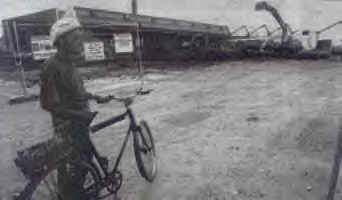|
The Raleigh Chopper Owners Club |
||||||||||
|
||||||||||||||||||||||||||||||||||||
| HOME PAGE | ||||||||||||||||||||||||||||||||||||
| |
This site will be continually updated!!
|
|||||||||||||||||||||||||||||||||||
 Raleigh's operations director, Alan Spencer, said: "The canteen served the
factory way back in time but had not been used for 12 to 15 years. It was
derelict and certainly not a part of Raleigh's recent past."
Raleigh's operations director, Alan Spencer, said: "The canteen served the
factory way back in time but had not been used for 12 to 15 years. It was
derelict and certainly not a part of Raleigh's recent past."Text and image from article in Evening Post, by Andy Smart